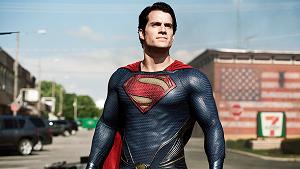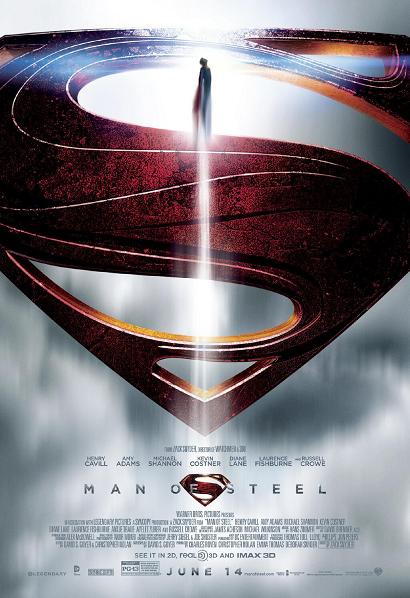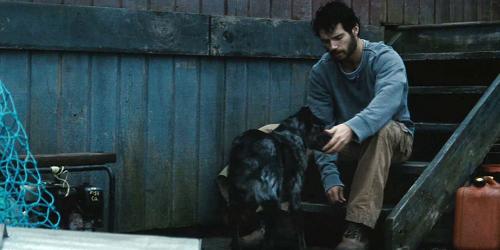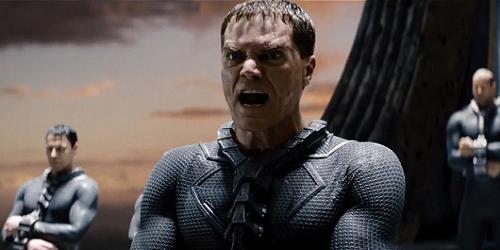
Well, now, here’s a fine how do you do: Zack Snyder made a good movie. Granted, he’s made good movies before, but it’s been so long since he released his hyper-muscular remake of Dawn of the Dead that seeing him output something that’s actually watchable from start to finish comes off as something of a shock. In the intervening years, he’s made films containing individual sequences worthy of the praise they rightfully receive but which lack a top-to-bottom sense of cohesion; Sucker Punch inadvertently celebrates the male gaze it tries to critique, and Watchmen is at its best in its first twenty minutes, after which the story begins and the narratively disinclines, Snyder finds himself in a degree of trouble.
 So Man of Steel feels like a step up for him, though that praise does the film a disservice; Snyder has made something that’s legitimately solid on its own merits and not just when it’s stacked against the rest of his filmography. Even describing Man of Steel as an improvement over Bryan Singer’s deplorably awful Superman Returns damns it with faint praise. Without a doubt, Snyder has made the Superman movie that comic book fans have long been waiting for, an imperfect but satisfying and worthy reboot of the last son of Krypton’s name. At the same time, Man of Steel is precisely the sort of work that’s capable of riling the fanboys who comprise its core audience, and if nothing else it’ll be interesting to soak in their reactions to a few of the film’s third-act developments.
So Man of Steel feels like a step up for him, though that praise does the film a disservice; Snyder has made something that’s legitimately solid on its own merits and not just when it’s stacked against the rest of his filmography. Even describing Man of Steel as an improvement over Bryan Singer’s deplorably awful Superman Returns damns it with faint praise. Without a doubt, Snyder has made the Superman movie that comic book fans have long been waiting for, an imperfect but satisfying and worthy reboot of the last son of Krypton’s name. At the same time, Man of Steel is precisely the sort of work that’s capable of riling the fanboys who comprise its core audience, and if nothing else it’ll be interesting to soak in their reactions to a few of the film’s third-act developments.
That’s because Man of Steel‘s climax resembles a tightrope walk in which the film balances fan service against breaking formula. Everything that precedes the film’s ultimate titanic action sequence sticks to tradition; we know this story, either through comic books or through Richard Donner’s first two Superman pictures. It’s a narrative fixture in our popular consciousness and has been for decades: Kal-El, child of the dying planet Krypton, is blasted into space by his parents before their world implodes. Years later, that child crash-lands in Kansas’ heartland, becomes the surrogate son to a human couple, and develops deific powers thanks to the energy produced by the Earth’s sun. Snyder doesn’t buck the character’s legend in terms of basic set-up, but by the time the film ends, he’s put his own distinct stamp on Superman, and that will delight some as much as it enrages others.
Whether or not the inevitable outcry over the actions Snyder forces Superman to take here is valid is another argument for another article. (Short version: kind of but not really. It’s complicated.) What’s less debatable is that he’s woven together a Superman yarn that’s far better than expected despite being less than it should have been. What it does well, it does very well; what it doesn’t do well ends up weighing Man of Steel down like a sack of Kryptonite. Frustratingly, the film doesn’t excel and fail in specific areas as much as it tends to do both in the same places; the acting is good, but the actors often lack chemistry, the spectacle is impressive, but wears out its welcome, and Snyder makes good storytelling choices as often as he makes bad ones.

The result is a remarkably uneven film. Smartly, the script- written by David Goyer, with a little help from Christopher Nolan- starts us off in the midst of Krypton’s Armageddon, an event we haven’t observed before (at least not like this), and then fast-forwards thirty years into Kal-el’s (Henry Cavill) adult life. We only experience his childhood through flashbacks. Another superhero origin film would take us linearly through its protagonist’s youth, painstakingly covering every base possible to convey the character’s hero’s journey; Snyder avoids that trap, and for the most part his method succeeds. Yet Snyder is nothing if not indulgent, and he winds up using a few too many such reminiscences, causing Man of Steel to shuffle and lag. In true Snyder fashion, these scenes often work in context with themselves, but taken in tandem with the rest of the picture, they’re unnecessary and shamefully expository diversions.
Maybe we shouldn’t expect anything less from Goyer, one of Hollywood’s most inelegant writers, and Nolan, whose Dark Knight films make a habit of expressing through dialogue the conflicts and themes at play without a hint of subtlety. (Which is to say nothing of the contradictory internal logic they apply to some of those ideas. Clearly neither of them consulted Webster’s on the meaning of “choice”.) The good news is that despite the absence of nuance, they’ve instilled Man of Steel with the morality and humanity that Snyder’s work often lacks, and which is absolutely required in a Superman yarn. What kind of man does Clark Kent want to be? Even before he learns who he is through a happily coincidental plot device that lets him communicate with his dead birth father, Jor-El (Russell Crowe), Clark is compelled to use his powers to help the innocent, something his adopted Earth father, Jonathan Kent (Kevin Costner), warns him against doing and for good reason. What do you do when you know you have the means to protect people but you can’t for fear of revealing yourself as an outsider?
The film doesn’t explore that conundrum as richly as it could, but Cavill carries the burden of Superman’s birthright with tragic stoicism. If anything works about Man of Steel– and despite what you’re reading here, many things do- it’s Snyder’s leading man. Cavill certainly looks the part, but it’s his ability to convey Superman’s internal struggle, often through little more than his eyes, that gives his performance heft. Man of Steel is his movie. Period. Michael Shannon, stepping into Terrence Stamp’s role as General Zod from Donner’s 1980 film, and Crowe, at the height of unadulterated awesomeness, both come within a hair’s breadth of stealing Cavill’s thunder; Shannon builds off of the script and makes Zod into a complex villain who truly believes he’s doing the right thing, while Crowe gets to stand around and crush bad guys with an indifferent, superior wave of his hand. They’re utter blasts to watch for totally different reasons.

Strangely, that leaves Amy Adams out in the lurch. She’s good- she’s Amy Adams– but no matter how much Nolan and Goyer tinker with the inner workings of Lois Lane, they fail to make her much more than a cipher. We don’t really know who she is as a person, and when she shares her inevitable kiss with Superman (because they have to), it lands with a thud. At least she’s not relegated wholesale to the thankless role of damsel in distress, and whenever she is, it’s only because she- like Superman- is compelled to intervene and do the right thing.
G-S-T Ruling:
Of course, by the time Man of Steel arrives at its thunderous climactic battle, she’s forced to the sidelines and stops mattering for the remainder of the picture. After the second time Zod and Superman hit each other with the force of a sonic blast, so does everything else, at least until what’s surely the film’s most controversial moment plays out and Man of Steel really begins to feel like a Zack Snyder film. The scope and scale on display here deserves applause- it’s the superhero elevated to the divine- but as the two godlike combatants topple buildings and toss around satellites like beach balls, the sudden shunting of that ever-important human element becomes all too noticeable. Man of Steel has heart, soul, muscles, and craft on its side that raises it head and shoulders above average summer fare; it’s only missing the consistency to carry its throughlines to the very end.

4 Comments
Dan O'Neill
Good review Andrew. I think I may have to give this a second-viewing somewhere down the road, but for right now, it was just okay. Nothing really special.
Andrew Crump
“Not as good as it could have been” is becoming a running theme with blockbusters. That said I quite liked it even with its flaws.
Sam Fragoso
This mostly sums up my sentiments — “Man of Steel has heart, soul, muscles, and craft on its side that raises it head and shoulders above average summer fare; it’s only missing the consistency to carry its throughlines to the very end.”
Though I still think you’re being a bit generous. Good review though — as-per-usual.
Andrew Crump
Thanks Sam. Been a while!
You think I’m being generous? I was actually worried that I sounded overly harsh. I liked the movie, but the things that bothered me about it really bothered me, and a couple of them I didn’t even touch on here.